Artificial Intelligence (AI) is rapidly changing how companies function. No matter how big or small your company is, it can probably benefit from the improved decision-making and business automation that AI can provide.
The foundations of AI business process automation and how to use AI to automate business will be covered in this article, along with its advantages, tactics, and implementation difficulties. To help you stay ahead of the curve, we’ll also examine the trends influencing AI-powered automation in the future.
To avoid AI detection, use Undetectable AI. It can do it in a single click.
Table of Contents
What is Business AI Automation?
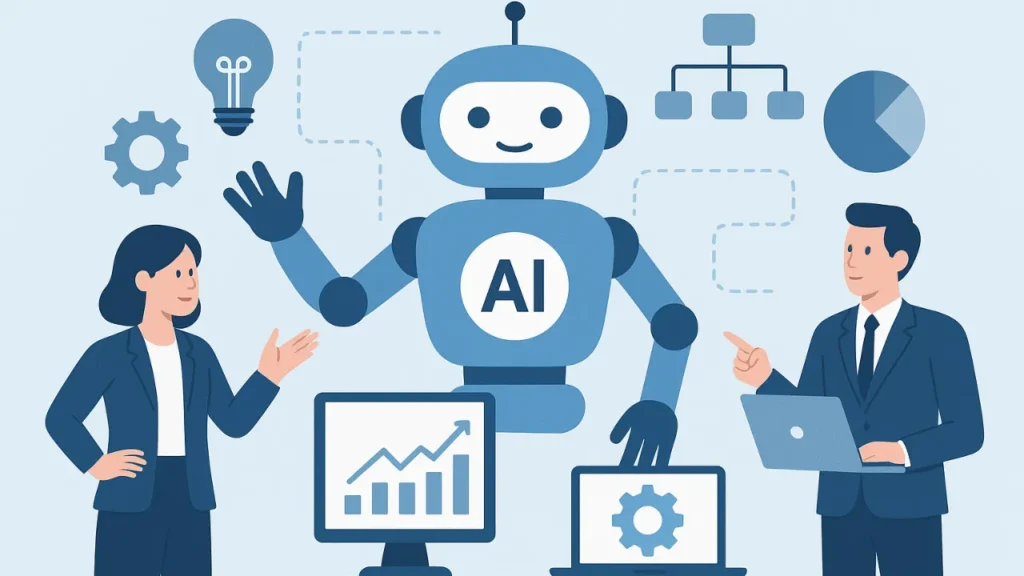
In the business world, artificial intelligence (AI) automation is the use of AI technologies to carry out operations and procedures with little to no human involvement.
It entails using artificial intelligence (AI)-driven technologies such as robotics, machine learning, and natural language processing to automate a wide range of business tasks, from complex activities to repetitive manual tasks. These tasks frequently include data entry, customer service, inventory management, and even decision-making.
By automating both repetitive tasks and complex workflows, AI automation can help businesses increase productivity, lower operating costs, minimize human error, and scale more successfully.
Using chatbots to improve customer service, automating marketing campaigns with predictive analytics, and optimizing HR procedures are some important instances of this kind of automation.
Business Automation: What Is It?
Business automation is the process of automating manual, repetitive tasks in business workflows using technology. Business process automation (BPA) is another name for it. Business process automation has several advantages, such as improved productivity, fewer errors, and a decreased need for human involvement.
Using software such as workflow management tools, enterprise resource planning (ERP) systems, or robotic process automation (RPA), business process automation (BPA) aims to streamline tasks like data entry, invoicing, order processing, employee onboarding, and customer service.
Its objective is to increase productivity through the automation of tasks that adhere to distinct, rule-based patterns.
What distinguishes it from AI automation, then?
Although BPA and AI automation can coexist, the primary distinction is that BPA concentrates on automating particular tasks or processes that adhere to predetermined rules, while AI is capable of learning, adapting, and making decisions based on data.
BPA and AI can collaborate effectively. For instance, you can use AI to examine spending trends and find areas for savings, and BPA to automate invoice approvals. When combined, BPA and AI can improve departmental operations, increasing efficacy and efficiency.
AI’s Advantages for Business Automation
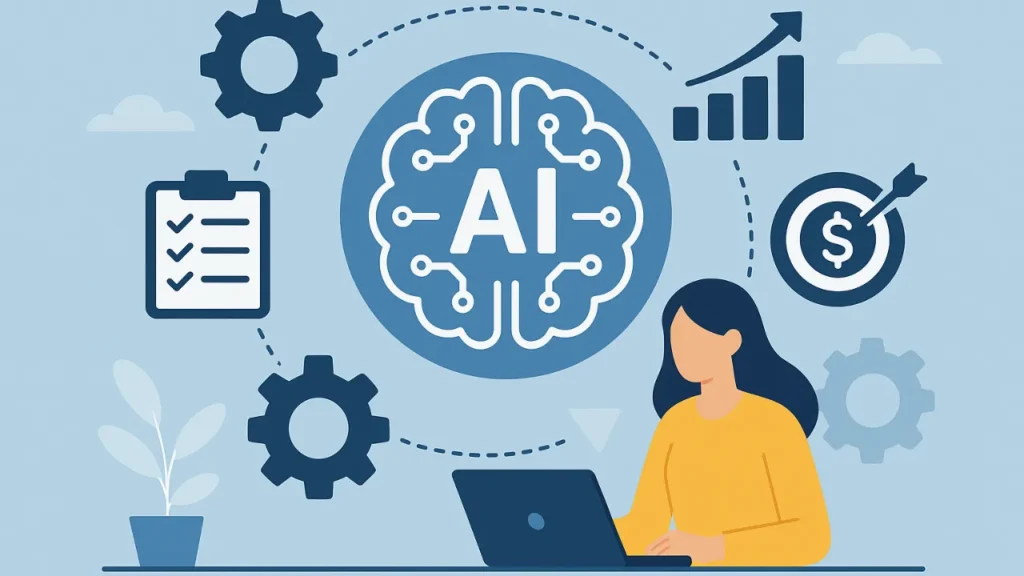
Some of the biggest benefits of utilizing automation driven by AI are as follows:
Enhanced Effectiveness and Output
In addition to processing and analyzing data rapidly, AI can also perform repetitive tasks more quickly and effectively than human workers can. As a result, work is finished more quickly, and staff members have more time to concentrate on more strategic tasks that promote company expansion and success.
Enhanced Precision and Decreased Errors
Human error is unavoidable, particularly in fields like computation and data entry. AI automation can improve accuracy and consistency by doing away with the need for human intervention in repetitive tasks.
Lower Operating Expenses
Employee time spent on repetitive tasks can be saved through automation, which lowers costs. Additionally, business operations can continue without the overhead expenses of overtime or night shifts because AI can work around the clock.
Automate Routine Tasks
AI can be used to automate time-consuming, repetitive tasks like processing invoices, setting up appointments, and answering customer inquiries. Your teams can concentrate on strategic, value-adding work if they are not burdened with manual, administrative busy work.
Make Data-Driven Decisions Possible
By using sophisticated algorithms, machine learning, and data analysis to glean valuable insights from vast volumes of structured and unstructured data, artificial intelligence (AI) can be a fantastic tool for facilitating data-driven decision-making.
In order to provide a comprehensive overview of the company and make it simpler to identify trends and areas for development, artificial intelligence (AI) systems can automatically collect and combine data from a variety of sources, including customer interactions, sales reports, marketing metrics, and operational data, into a single centralized platform.
Read Also >>> AI and Cloud Technology (Cloud Computing) in 2025
Improve Customer Support
Chatbots and virtual assistants driven by AI are able to manage large volumes of customer requests and offer tailored answers to promptly satisfy customer needs, particularly when responding to routinely asked basic questions that support teams receive.
In addition to enhancing the customer experience, this gives human customer support teams more time to concentrate on more complicated support cases that call for their expertise and more in-depth training.
Make Sure There is Better Compliance
AI systems are capable of continuously observing business transactions and processes to make sure they follow internal policies and legal requirements.
AI can identify possible compliance risks, like illegal activity or data breaches, in real time by automating monitoring tasks. AI can also conduct routine audits by examining operational workflows, personnel data, or financial transactions, guaranteeing continuous compliance without the need for manual reviews.
This can be particularly beneficial for companies operating in highly regulated sectors, but it also improves compliance for a wide range of organizations.
Business Process Automation (BPA) Strategies
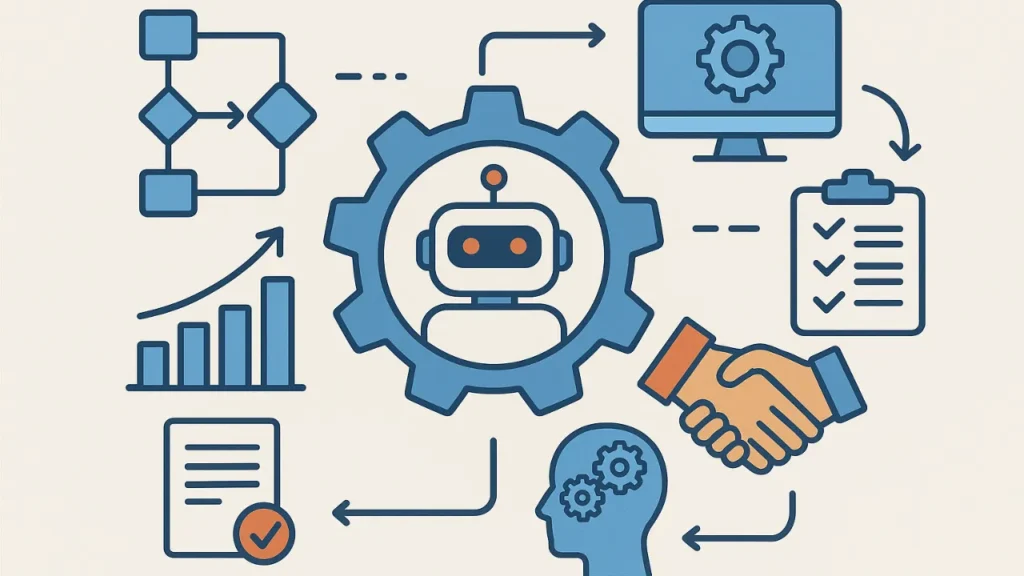
Businesses should have a well-defined plan before putting AI automations into practice. The following are four essential tactics for using AI-powered automation to streamline corporate procedures:
Using AI to Automate Customer Service
AI chatbots and virtual assistants can provide prompt, precise answers to consumer inquiries around-the-clock. In addition to improving the customer experience, these tools allow customer service representatives to concentrate on higher-level interactions.
Making Supply Chain Management More Efficient
AI can be used to optimize supply chain management, including supplier interactions and inventory management. AI helps businesses cut waste, cut costs, and improve supply chain reliability by predicting demand trends and identifying inefficiencies.
AI-Powered HR Task Automation
By automating time-consuming processes like interview scheduling, candidate screening, and employee record management, HR departments can maximize the benefits of artificial intelligence. Through data analysis, AI tools can also assist in tracking employee performance and enhancing hiring practices.
Streamlining Accounting and Financial Procedures
By automating processes like financial reporting, expense tracking, and invoice processing, artificial intelligence (AI) can improve accounting and finance. Additionally, AI can spot trends in financial data, which helps companies spot fraud, cut expenses, and improve budgets.
The Difficulties in Applying AI to Business Automation
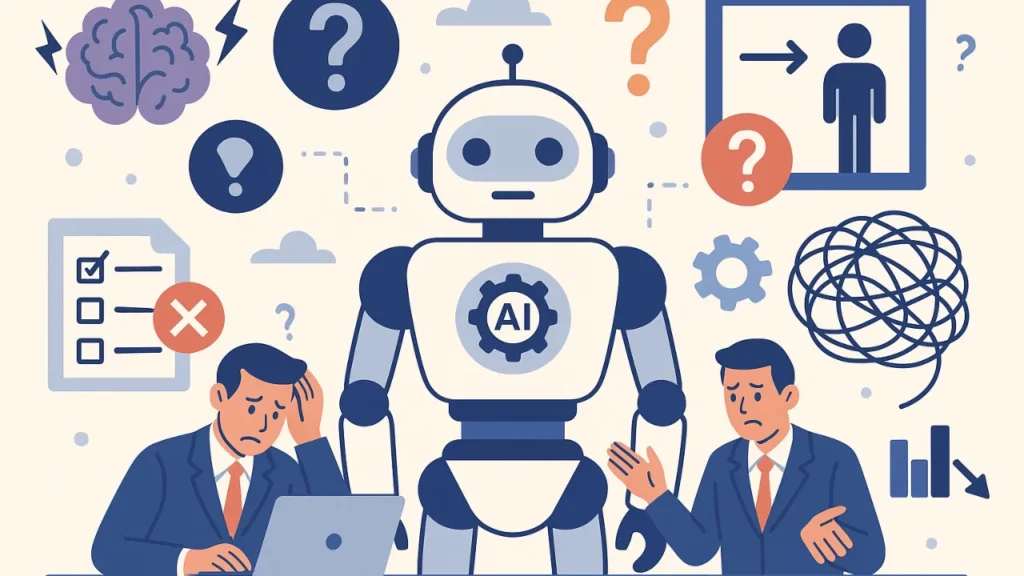
Businesses may encounter certain obstacles when implementing AI-powered automation, notwithstanding the benefits. Here are a few typical roadblocks:
High Implementation Expenses
The initial costs of implementing AI-powered technologies can be high. The expenses can be too high for small businesses, ranging from hiring staff to buying AI software. But as AI technology develops, these expenses might decrease.
Concerns About Data Security and Privacy
For AI systems to function effectively, data is essential. However, it’s crucial to ensure that private client and business information is safeguarded. To avoid legal ramifications, businesses must prioritize data security and follow compliance regulations.
Opposition to Change
Because they are unfamiliar with the technology or fear losing their jobs, workers may be reluctant to adopt AI automation. To get around this, companies should spend money on training and cultivate a mindset that sees AI as a tool to maximize human labor rather than as a replacement for it.
Connectivity to Current Systems
It can be challenging to integrate AI into current IT infrastructure and tech stacks. For AI automation to be successful, new AI tools must be compatible with legacy systems. These difficulties can be lessened with a phased approach.
How to Use AI to Automate Business?
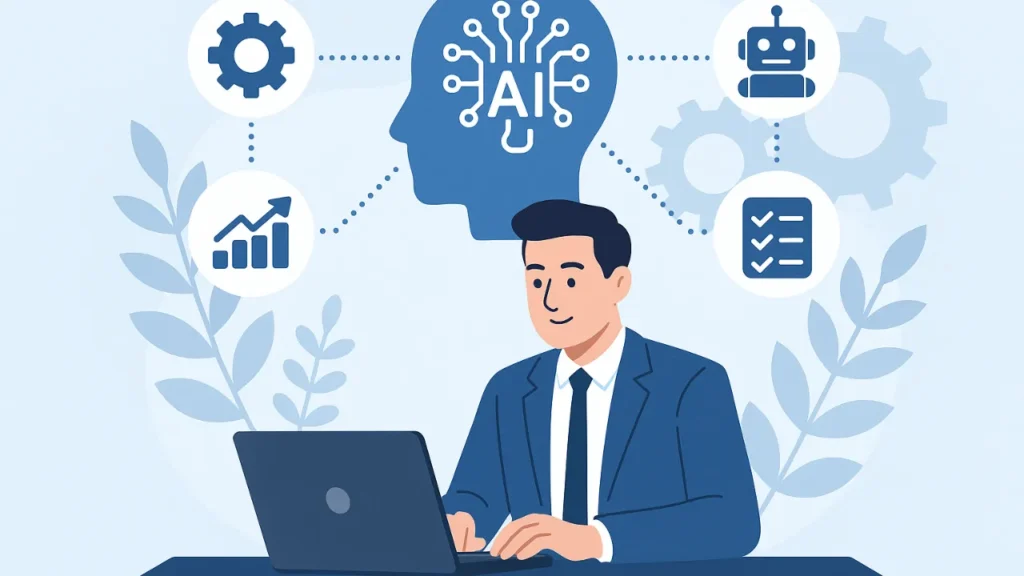
Careful planning is necessary for the successful integration of AI into business processes. Businesses can use these five useful steps to help them navigate the implementation process:
Determine which business procedures can be automated: Assessing which tasks are most time-consuming and repetitive for you and your team should be your first step. Pay attention to procedures like data analysis, inventory control, and customer service where AI can be most helpful.
Select the appropriate AI platforms and tools: Selecting the best platform for your needs can be challenging with the abundance of AI tools available on the market. Prior to selecting the tools that best suit your objectives, it’s critical to thoroughly assess particular needs.
Teach your staff to use AI tools: Employees must be proficient with the tools for AI automation to be successful. To give your staff the abilities they need to collaborate with AI technologies, invest in training.
Begin with modest pilot projects: It can be daunting to implement AI automation all at once. Rather, handle it as you would any other software integration or new product. Prior to scaling up, begin with small pilot projects to test the technology and make necessary adjustments.
Evaluate and enhance performance: After implementing AI tools, keep an eye on their effectiveness to ensure you’re reaping the benefits. To evaluate the effects of AI and pinpoint areas for development, monitor important metrics such as time saved and error reduction.
Trends of AI for Business Automation
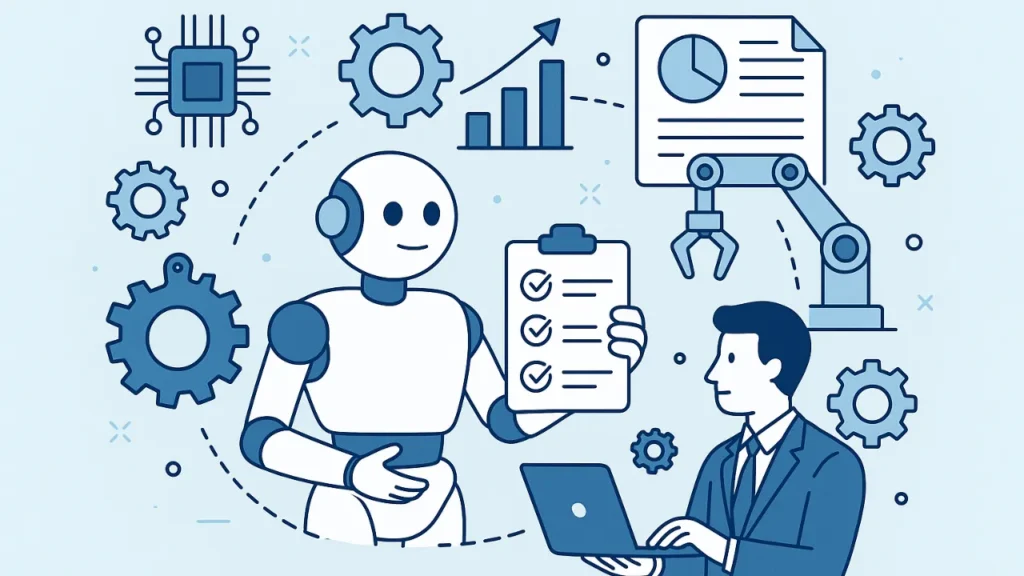
AI-driven business automation has a promising future, with new developments poised to completely change entire sectors. We believe that the following three trends will influence how AI is used in business going forward:
Growing Use of AI-Driven Decision-Making
AI is being used by more companies to aid in strategic decision-making. Decision-makers can now depend on AI to direct their business strategies because of its capacity to process data and forecast trends.
Increased IoT and AI Integration
AI is being incorporated into the Internet of Things (IoT) more and more to create smarter systems and gadgets. With AI-driven IoT devices able to monitor machinery, anticipate maintenance requirements, and maximize production, this combination has the potential to completely transform sectors like manufacturing.
AI-Powered Customization in Customer Support
AI is using hyper-personalization to improve customer service. AI can improve customer satisfaction and loyalty by analyzing customer data to provide personalized product recommendations and support.
AI-driven automation has the potential to revolutionize businesses seeking to increase productivity, cut expenses, and maintain their competitiveness if applied properly.
Businesses may fully utilize AI to propel success by comprehending the advantages and difficulties, putting effective strategies into place, and keeping ahead of new developments.
Conclusion: How to Use AI to Automate Business?
In today’s rapidly evolving business landscape, understanding how to use AI to automate business processes is crucial for success. AI-driven automation tools empower small businesses to streamline their workflows, enhance customer support, and improve overall customer experience.
By integrating AI technologies, businesses can automate repetitive tasks and leverage AI systems to optimize efficiency across various functions. The use of AI chatbots and virtual assistants illustrates practical use cases where AI can significantly enhance operations.
Moreover, embracing AI and automation allows business leaders to focus on strategic growth rather than mundane tasks. Implementing AI solutions not only automates time-consuming processes but also fosters innovation by enabling businesses to adapt quickly to changing market demands.
Ultimately, the benefits of using AI in business automation are profound, making it essential for businesses to explore and implement AI-powered automation to remain competitive.


